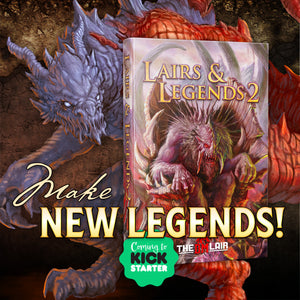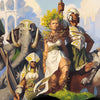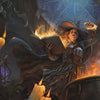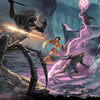15 D&D Worldbuilding Mistakes You Should Avoid
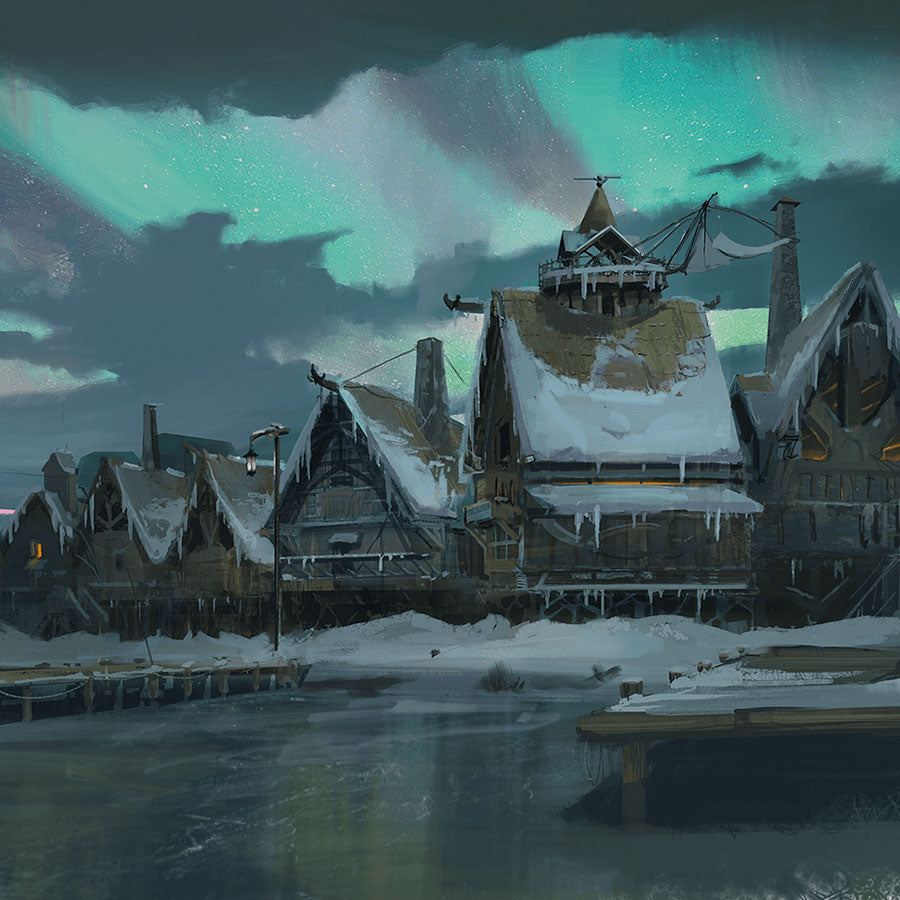
Written by Luke Hart
Whether you create your own world for your D&D game or use a premade campaign setting such as Eberron or Golorian, you are a world builder. The fact is, the role of world builder is integral to being a dungeon master, no matter how you slice it.
I'm currently running a game in the Eberron campaign setting, and I am world building every single time I prep for my games. From fleshing out NPCS the characters are going to encounter to developing secret lore to be uncovered to creating political machinations that are going on behind the scenes—I'm always worldbuilding.
So, today we are discussing 15 D&D worldbuilding mistakes that dungeon masters should avoid!
Watch or listen to this article by clicking the video below.
#1 Worrying Too Much About Worldbuilding
World building is important, yes, but it is not the most important thing in your game. Most players are going to derive a whole lot more fun and excitement out of the adventures that they go on, developing their characters and leveling up and getting access to new spells and abilities, and interacting with interesting and unique NPCS in the world. It's these elements that tend to be the focus of most gaming sessions. Yes many players love learning about the lore of the world, and NPCS are part of a world and can be heavily influenced by the world. However, never forget that the world is the backdrop, and even though its tendrils reach into most other aspects of the game, it's not the most important thing. So, if you're a game master that doesn't enjoy world building, and you don't want to create your own campaign setting, and sometimes you feel bad because you see lots of other game masters talking about creating their own special worlds—don't feel bad. Your game can be just as amazing as theirs or any other.
#2 Lack of Conflict
Conflict is the bread and butter of any tabletop role-playing game. Without conflict, there is no game. There are no adventures to be gone on. There is nothing for the characters to do. There is no reason to even gather around a table and Chuck dice. As the game master one of your primary roles is to create conflict that the players can then resolve. Consequently, it would greatly behoove you to build conflict into your game world, the campaign setting. This may be a conflict between powerful individuals, Noble families, merchant cartels, underworld crime syndicates, or entire nations. However you want to do it, it's fine. Just make sure the conflict is weaved throughout the world you create.
#3 Not Understanding What Worldbuilding Is
World building means different things to different people, and it should, because depending upon how you approach worldbuilding as a game master it literally is something different. You might be creating a game world from scratch, but you might also be adapting a premade campaign settings such as Eberron to suit your own needs. World building can mean evolving and growing a game world based on things that happen in the campaign. It can mean making the world feel alive by injecting a verisimilitude. World building is all of these things and more.
#4 If the game master is using a premade world, they don't need to world build
I've already alluded to this, but I wanted to spell it out so that it's very clear. Even if you are using a premade setting, you will need to world build constantly. Most pre-made campaign settings are not completely flushed out; they don't contain all of the details that you need about the world. And many times that is by design. One of the things that I love about the Eberron campaign setting that Keith Baker made—and I'm specifically talking about the 5th edition version—is that it gives me just enough information to get started, but it gives me lots of latitude to adapt and flesh out the world as I see fit. It's also an amazingly interesting game world that doesn't fit the mold of other generic campaign settings that are out there. World building also involves evolving the world, which happens regardless of whether or not you started with a premade campaign setting. So, if you're a game master using a premade campaign setting, stick around, because you're still a world builder.
#5 Waiting to play until the world is finished
Do you have any idea how long it takes to create a completely fleshed out campaign setting? I mean like totally ready ready ready? Probably years. Are you really going to wait to start running your game that long? I mean OK maybe you do enjoy a world building, but don't you think your world deserves to have players experience it?
The mistake that some game masters make is that they strive to build entire nations, continents, or even the entire planet before the game begins. Now this is great if you have the time and inclination, but when it delays the start of the game, it's a problem. Don't let your worldbuilding get in the way of playing the game.
My recommendation for getting started with portal building is to focus on a tiny region where the characters’ early adventures will take place. That part of the world, that tiny part of the world. And then expand the world as the scope of the characters adventures grows. So you start with one town or city—shoot make it a village so that it's that much easier. Then build the train and environment in maybe a 50-mile radius around that location. Create some points of interest and one dungeon in that region. And that's it; you are ready to go.
And this mistake segues into the next one.
#6 Creating, Not Adapting
Even if you're making your own campaign setting, that doesn't mean you can't steal ideas, concepts, and even entire towns or regions, and put them into your campaign setting. You're probably going to heavily adapt to them and tweak them, but having that base to start from will probably reduce your workload and get your setting ready faster. This also leads to a related point which is trying to create in the void. Creativity is hard when you don't have a starting point. But when you expose yourself to ideas and concepts that already exist, many times those spark your own creativity. So immerse yourself in literature or movies or other campaign settings; and then steal and borrow to fuel your imagination.
#7 Lack of Depth
Your world needs details. It thrives on details. Verisimilitude and how much your players experience immersion is going to depend upon those details. So, you need to create a game world that has depth, that has all of those details that make it seem like a real world. Now to do this, I recommend using a systematic approach, a methodology that will help you develop those details. I realize that many people think that creativity has to be this chaotic unorganized process, but I strongly disagree. If you use a system allergy to help focus your creativity, you're going to be well served. I personally recommend using the SUPREME Method of Worldbuilding. It breaks down world building into seven parts: social constructs, underworld activities, political structures, religious pursuits, economy, military, and environment. In fact I have an entire video on the SUPREME Method of Worldbuilding if you'd like to check it out.
#8 Detail Overload
And the converse of the previous mistake is also a mistake. It is entirely possible to focus too much on the details, both during preparation and during running the game. OK so yes, you need to develop the military for a local region. You may want to know the different ranks of the soldiers, and the name of an officer or two in case it comes up during game play. You probably want to know what their uniform looks like and what sort of weapons they typically carry. But do you need to know the names of all the officers? Do you need to establish the exact positioning of the guard posts throughout the region? Do you need to create maps of all of their fortifications? How detailed do you really need to get? The more you lose yourself in these details during game prep, the less time you're going to have to focus on the other aspects of game prep.
The other pitfall is focusing too much on these details during gameplay. This usually manifests itself as lore dumps. In my Eberron game, I make a specific effort to drop little pieces of lore about the game world to my players throughout the campaign. But I am very careful to do it in short bursts that don't hog tons of table time. Players are usually interested in the lore of your world, but they generally don't want massive lore dumps. Keep it short and sweet.
#9 Not Evolving the World
Worlds are not static places. Things are constantly changing, and your world should change in at least two ways. First and most importantly in my opinion, you should change aspects of your world in response to your players decisions and actions. Consider what happens when characters succeed or fail on their quests. If you're using the supreme world building method, consider how character choices and actions affect those elements.
In one of my games a player once gave the map to the elven home world away for a handful of gold pieces—at the time they were very broke and needed the money. However, the release of that secret provoked the entire elven nation to march to war against the city that possessed the map. One small decision; one massive consequence. And I'll tell you those few sessions we played that revolved around that situation were tons of fun and my players are really seem to enjoy it.
Second, your world should evolve and change with the passing of time. As your campaign draws on, make sure that you are incorporating logical changes. One noble family may fall from power, and another rises. A merchant that the characters have dealt with before, has gone out of business. An entire village may have been wiped out due to a natural disaster. When your world changes over time it reinforces verisimilitude and makes it feel like a real living place.
#10 Not Starting at the Beginning
Two important things to consider for world building are the structure of religion and the cosmology. This should probably be some of the very first things that you flush out. How religion works in your game world can have a massive effect on the world itself. In Eberron there is a pantheon but the deities don't often have a strong presence in the world. Instead you get the feeling of a pantheon that’s a bit detached from the day-to-day life of the populace, or of a pantheon that might even just be pure fiction made-up by the inhabitants of that world. They might not even exist. Your fantasy world might not even have a pantheon; It's not a requirement. And remember, if you're stuck or don't want to create your own deities, look to the real world for examples that you can draw inspiration from.
And when I talk about cosmology, I'm referencing the planar structure of your game world. In many fantasy tabletop RPG cheese there are different planes right? You have the material plane and the astral plane and the plane of fire and the plane of earth and so on and so forth. A particular planar structure will impact lots of things in your world not least of which is where certain creatures such as devils and demons even dwell. Also remember to consider astronomical features. Does your world have multiple sons? How many moons are there? Are the constellations tied to the deities or something else?
#11 Overusing Tropes
Look, tropes exist for a reason. There are things that people have found cool and interesting, and thus they pervade many aspects of our world. However, if you overuse these tropes, and they fill your game world, one could argue that there's very little unique about your world. And this can make your world feel unoriginal, uninspired—and at that point you have to ask yourself “why even bother?” Using some tropes is OK, of course. My dwarfs are always going to speak with a Scottish accent. Period, end of story. And in my games if you ever meet a dwarf that does not speak with a Scottish accent, you should be on high alert because something is very wrong. So, make sure that you infuse new imaginative and unique elements into your game world. These are the things that make your world special, and should inspire your players to learn more about it.
#12 Skimping on Monsters People
Since almost all tabletop role-playing games come with monsters pre made for you, it may be tempting to port them over directly into your world without many changes. However, you can get a lot of mileage out of small adaptations to monsters that make them uniquely fit in your world. For instance, trolls In your world may have originated From one of six moons. And they only regenerate when they are in the moonlight That moon. Therefore in your world trolls only come out at night when that moon is visible in the sky. And during full moons they gain immunity to fire, making them a nightmare to deal with. You see? That one small change has reinforced the verisimilitude of your world and the special position that trolls possess in it. Of course, you can design your own monsters from scratch as well.
#13 Skimping on People
Remember that interacting with people—the NPC's—in the world is probably going to make up a lot of your game time. So don't short change their development. If you're following the supreme world building method, you'll notice that many of the aspects in that system either include developing the inhabitants of your world or they affect the inhabitants. You want to consider things such as which races exist in the world. What are the people like? Are they happy? Do they feel oppressed? What do people talk about in the Taverns or at the market? What kind of slang and expressions do they use? What languages do they speak? These are the sorts of details that make people in your world come to life to your players. Don't overlook them.
#14 Neglecting the Impact of Magic
If magic exists in your world it will have a very noticeable impact on the world. Or it may not, if magic is not very powerful. Eberron is a high magic world, so you see its influence everywhere. There are airships that float through the sky powered by captive elementals. Lightning rail trains zip back and forth across the continent. Artificers abound, and basic magic items are sometimes possessed by even the common folk. So ask yourself, how does magic affect your world? How does magic affect the culture? Does it impact technology, possibly fueling technological achievements? How does magic affect daily life? How do people feel about magic users? Are they accepted or feared? Your answers to these questions are going to influence a lot of other elements in your world.
#15 Not Involving Your Players in the Process
Yes, it is your world. However your players interact with your world during every game session you run. Therefore, I strongly recommend involving your players in the world building process to one degree or another. It may be as simple as allowing their choices and actions to affect your world. They will love this, trust me. But you could go farther than that if you wish. You could create parts of your world around your character's back stories. You might even let your players flesh out specific areas of your world. Perhaps Jim gets to design a village, and Samantha creates the elemental plane of fire. I don't know. Now yes, there is a chance that some or many of your players may not be interested in engaging too much in world building. And that's fine. But for those that do, I guarantee you they will be that much more invested in your world and in your game.
Confront Devious Fey and Their Tricksy Plots!
For years, the fey creatures inhabiting Pelview Grove to the north and Pelfell Bog to the east have not been a source of trouble, though perhaps they were a shade too mischievous at times. That has now changed.
Beset on all sides by a variety of issues -- childish pranks gone wild, dwarves forced out of their own brewery, and farmers missing -- the Aeredale guard is looking for help from local adventuring parties to set things right.
For those brave souls who accept the call to adventure, it'll be time to go into the fey.
If you’re looking to start up a new 5e campaign or reboot your current one, Into the Fey may be exactly what you need. Designed for levels 1 to 5, Into the Fey contains everything you need to start playing:
- Eleven fey-themed adventures for level 1 to 5 adventuring parties
- Over 40 new fey monsters
- The fully fleshed-out town of Aeredale
- Maps of Aeredale, the surrounding region, and the Fey Plane
- Player handouts
- Hag potion system
- 15 new fey magic items
- JPG image files of all Into the Fey adventure maps, including GM versions and gridded/non-gridded player versions
- JPG images files of all Into the Fey world maps
- Digital tokens of Into the Fey NPCs and monsters
Pick up the Into the Fey Ultimate Bundle to get the hardcover, the PDF, digital maps, and digital tokens.
Starting a new campaign can be tons of work; let Into the Fey do some of the heavy lifting for you!
-
Posted in
Game Master How-To Articles


